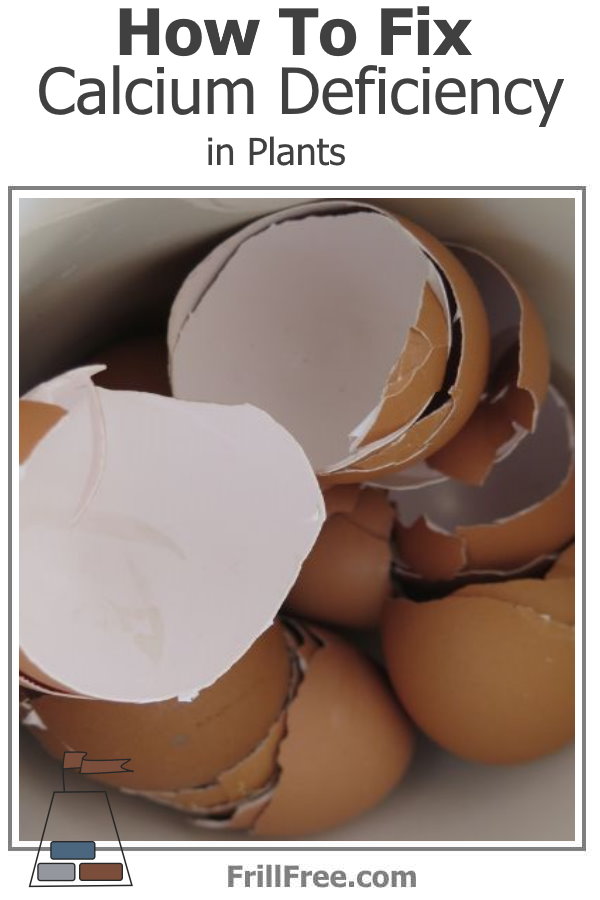- Homesteading
- Gardening for Beginners
- How to Fix Calcium Deficiency in Plants
How to Fix Calcium Deficiency in Plants
A Guest Post
Your plants may be suffering from a calcium deficit, which means it’s good for you to know how to fix calcium deficiency in plants. Allowing this nutrient shortage to develop may cause your plants to become small and weak.
In this article, I will give tips and a couple of solutions for this kind of problem.
What is the Main Role of Calcium in Plants?
When it comes to plants' health, you may ask yourself, why is calcium so important for them? It's not even a main nutrient, after all.
Plants in general, need more calcium than micronutrients to provide structural support for cell walls Sometimes, plant development can be limited if it does not have enough of this nutrient, which is why calcium is an essential element in the soil structure.
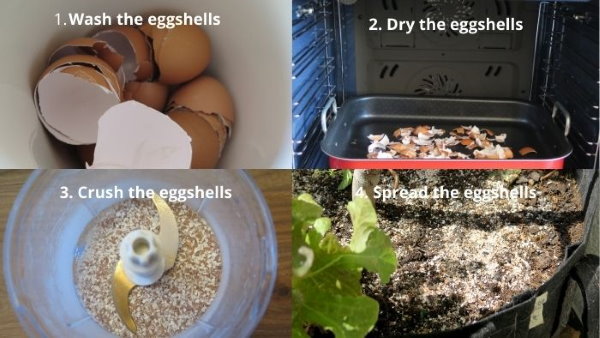 Preparing the eggshells
Preparing the eggshellsSymptoms of Calcium Deficiency in Plants
Calcium deficiency symptoms show primarily in young leaves and plants that are in early development. Deformed, chlorotic leaves, brown leaf tips, and slow meristem development may be the thing that you are going to see.
Calcium shortage makes the roots rot and turn black. Sometimes, this kind of root problem can lead to the plant's death.
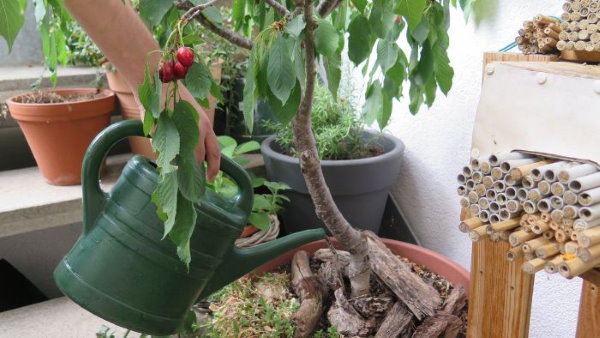 Adding calcium to plant, by watering it in
Adding calcium to plant, by watering it inCan Eggshells Help?
Eggshells are a good source of calcium for plants because their main component is calcium carbonate. Although adding pieces of eggshells to your plants will not provide instantly available calcium, as the shells take time to break down.
If you're going to use eggshells in a potted plant, make sure they're prepared beforehand by crushing or soaking them.
Begin by washing the eggshells to ensure that no leftover yolk or egg white attracts pests, carries diseases into the soil, or emits an odor. Allow for thorough drying of the eggshells, you can do it in the oven.
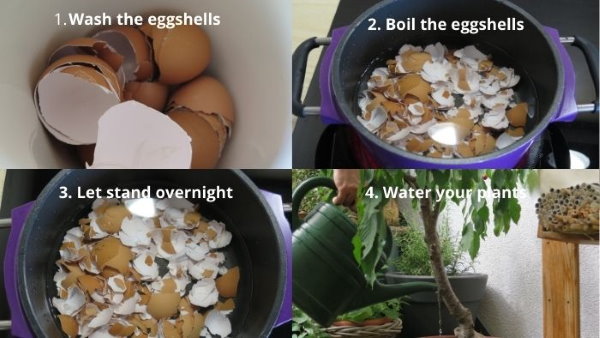 Using eggshells to provide calcium to plants
Using eggshells to provide calcium to plantsThe next thing to do is to crush the eggshells into a powder or small pieces. You can do this by using a coffee grinder or a blender. The smaller the particle size, the better the calcium will be absorbed by your plants. After you crush the eggshells into a fine powder, add it to the potting soil or in planting holes, this will improve the calcium content in the soil. Another way to use eggshells is to add them to your compost.
Alternatively, you may get calcium from eggshells by soaking them in water. You must take into consideration that calcium carbonate is poorly soluble in pure water, to increase its solubility, you can boil the eggshells in rainwater. Rainwater is saturated with carbon dioxide which increases the extraction of calcium carbonate.
First, boil the water with the eggshells in a saucepan. After that, soak them in water overnight. Remove the eggshells from your plants and water them.
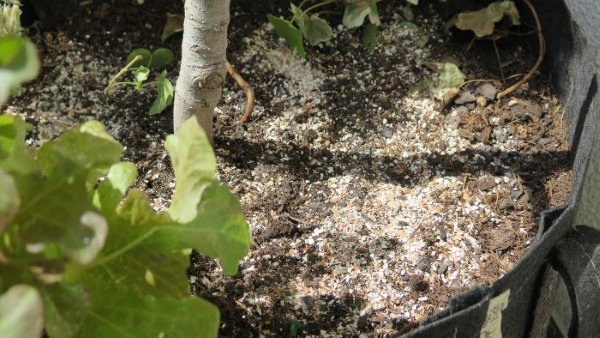 Crushed eggshells on top of the soil
Crushed eggshells on top of the soilCouple of ways to use eggshells in gardening
Compost
Adding eggshells to your compost bin is the simplest method to use in your yard. It's important to remember that the smaller the eggshells are crushed, the faster they'll break down.
Simply smash washed, dried eggshells into little bits with your hands if you don't mind shards of eggshell getting into your vegetable garden. If you want faster results you can grind the eggshells into a fine powder with a coffee grinder, rolling pin, or mortar and pestle.
Soil additive
If you don't have access to a compost pile, you may still treat your soil with eggshell powder. Simply sprinkle powdered eggshells on your soil or include them in your potting soil or fertilizer.
Mulch
Clean, crushed eggshells are used as mulch by some gardeners. Mulch may help regulate weeds and keep soil moisture, even if it takes a lot of eggshells to cover a whole area.
Mix With Coffee Grounds
You can mix used coffee grounds and finely crushed eggshells into your fertilizer or compost heap to increase nitrogen levels in your soil while keeping acidity levels low. The nitrogen concentration of the coffee grounds is strong, and the eggshells may help with the absorption.
The Disadvantages of Using Eggshells in Gardening
- Eggshells take a long time to degrade.
- Slugs are not killed by eggshells.
- Eggshells are ineffective in preventing blossom end rot.
- Root systems can be disrupted by eggshells.
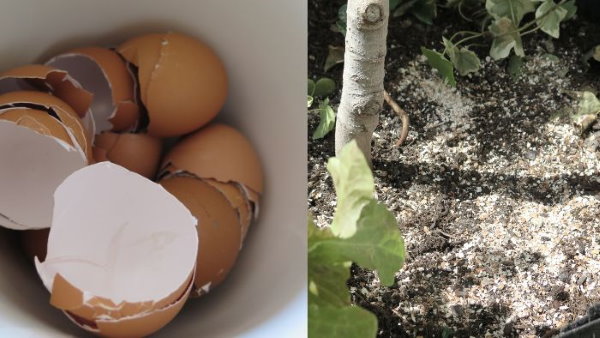 Eggshells and how to use them
Eggshells and how to use themGardening Using Oyster Shells
You can use oyster shells in your garden in a variety of ways. Their calcium concentration stimulates the synthesis of enzymes, maintains soil pH levels, boosts nitrate absorption, and strengthens plant cell walls.
If you're growing cruciferous veggies like cabbage and broccoli or leafy greens like lettuce and spinach, adding powdered oyster shells to your soil will have a significant impact on the general growth rates and health of your plants.
Oyster shells' rough texture helps to reduce soil compaction as well. Additionally, letting water pass through the soil without becoming stuck along the way, helps keep potted plants from becoming soaked.
Final Words on How to Fix Calcium Deficiency in Plants!
In conclusion, we have to understand that plants are living organisms that require calcium for growth, health, and reproduction. Calcium deficiency results in stunted growth and poor plant form and function.
Without calcium, plants cannot grow, reproduce, synthesize, and maintain healthy cells and tissues. If you care for your plants, you can buy calcium supplements or you can try and use eggshells in your garden.
Tony Manhart is the founder and editor-in-chief at gardeningslash. Tony’s enthusiasm and rich experience in all things related to growing plants have led him to share his knowledge with gardening aficionados all over the world.
When he is not working around his garden, Tony spends his time writing tips and tricks on various subjects related to plant cultivation and soil maintenance.
